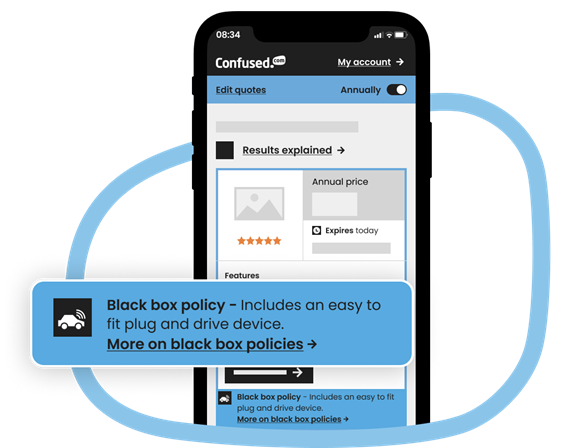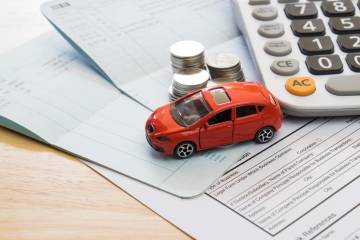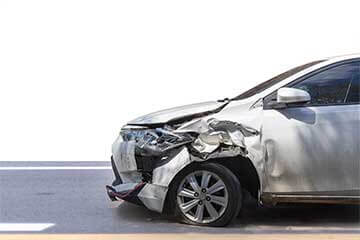"Driving can be pretty expensive when you first start out. The good news is there's plenty of things you can do to help reduce the costs. Comparing quotes, adding named drivers and paying annually are all quick and easy ways to save. Black box policies can be another good option, just be aware of the pros and cons before taking one out."
What level of car insurance do new drivers need?
As with all drivers, new drivers need at least third party insurance to drive on the road.
This isn’t always the best option though, and third party is often the most expensive level of insurance you can choose, despite it offering you the least in terms of cover.
If you’ve just passed your test and have an older car that may not be worth repairing if it’s damaged in an accident, then third party fire and theft cover might work for you. But again, this can often work out more expensive than more comprehensive cover.
If you want full cover for your car, as well as any third party’s, fully comprehensive is often the best option. This can be especially useful for new drivers who’s risk of being involved in an accident is higher than the average.
The three levels of car insurance you can choose from are:
How much do new drivers pay for their insurance?
Average insurance costs by years licence held*
1 year
£1,673
5 years
£1,096
10 years
£825
Car insurance can be expensive for new drivers.
While there’s a lot that goes into how your car insurance is calculated, this high price is largely due to new drivers being seen as riskier to insure than other, more experienced drivers.
*Confused.com data Q2 2025.
How can new drivers save on their car insurance?
Choose the right car
The make and model of your car can influence the cost of your insurance. Expensive cars with bigger engines and higher repair costs generally sit in higher insurance groups, and these groups can influence what you pay for your cover. Cars with widely available parts and smaller engines usually sit in lower insurance groups.
As they tend to be trickier to fix, automatic cars can be more expensive to insure too.
Compare quotes
Comparing quotes from a range of companies gives you more choice and a wider selection of policies to choose from.
Add a named driver
Having an experienced driver on your policy may help reduce your price. Adding a single named driver could reduce the price of your policy. Always list the person who drives the car most often as the main driver, and any occasional drivers as additional. Otherwise, this is seen as 'fronting', which is illegal.
Pay annually
While opting to pay monthly means you can spread the cost, it can increase your price because insuers charge interest for monthly payments.
Consider black box insurance
Telematics insurance, otherwise known as black box insurance, uses an app or box that’s installed in your car to monitor your driving. Your insurance costs are calculated based on how and when you drive. If you drive safely, it can make car insurance more affordable. While it's popular with students and younger drivers, it can help bring costs down for new drivers of any age.
Looking for safer driving tips for younger drivers? Try our young driver support zone.
Be accurate with estimated mileage
The more you drive, the higher your road-risk. Higher mileage usually means higher insurance costs, so don’t put down more than you need. The average mileage driven by our customers is around 6,000 miles.
Change your voluntary excess
The amount you agree to pay towards the cost of a claim is known as your voluntary excess, and can influence what you pay for your cover. And paying more doesn’t always lead to lower premiums. Just make sure you select an amount you’d be able to afford in the event of a claim
Build up a no claims bonus
Over time a no-claims bonus is likely to help save you money. Most insurers will offer discounts for drivers who don’t claim. Just a single year of no claims could save you money on your insurance.
*Confused.com data Q2 2025.
When does insurance start to go down for new drivers?
| Years licence held | Average insurance cost* |
|---|---|
|
0 years
|
£1,983
|
|
1 year
|
£1,673
|
|
2 years
|
£1,446
|
|
3 years
|
£1,277
|
|
4 years
|
£1,196
|
|
5 years
|
£1,096
|
|
10 years
|
£825
|
|
20 years
|
£603
|
*Confused.com data Q2 2025.
While new drivers face higher than average insurance costs, the good news is the longer you hold your licence, the lower your insurance costs tend to be.
Our figures show that you should start to see a reduction in your car insurance costs as early as one year after passing your test, with another big drop in cost at the 5 year mark.
Bear in mind though that experience isn’t the only factor that affects how your car insurance is calculated - but it is a significant one.
Other factors that affect what you pay include:
- Your age
- Where you live
- Your car's insurance group
- Your occupation
Is black box insurance good for new drivers?
Black box insurance can be a useful way for new drivers bring down their insurance costs.
Some black box policies are cheaper than standard car insurance from the start. But with others, your driving is monitored, either through an app you have to activate every time you drive, or via a physical device fitted to your car known as a black box.
The data collected is then used by your insurer to calculate your driving score. The safer you drive, the higher your score and the bigger the discount you might get on your insurance when you come to renew.
But while they can be a good way for new drivers to bring their insurance costs down, there are a few things to keep in mind:
They might not save you money right away as many policies require you to build up a driving score over the course of a year. This isn’t always the case, but it could mean that you’d have to wait 12 months before seeing any financial benefit.They might come with a curfew and some policies will penalise you for driving at night. While you’ll still be able to drive whenever you like, doing so past a certain time could affect the discount you get at renewal.
You might have to use your own mobile data if you have an app-based policy. It'll run through your phone's mobile data and if you’re not on an unlimited data plan, this could be another cost to consider.
They might not save you money at all if you’re a very poor driver as you’re unlikely to build up enough of a driving score to get a discount. You may even have your policy cancelled by your insurer, which can make it very difficult to find cover at a reasonable price in the future.
Look out for policies marked up with a 'black box' logo when comparing quotes if this is a cover type you're interested in.

What insurance add-ons are useful for new drivers?
When you get a quote, you'll have the option to add extras onto your policy. These add-ons usually come at an extra cost, but they make sure your insurance covers exactly what you need it to.
There are several extras available, but new drivers might especially benefit from:
Breakdown cover
Courtesy car cover
Motor legal cover
What our car insurance expert says
Need more help?
What do I need to get a quote?
It doesn’t take long to compare quotes, there are a few details you’ll need to get started:
Personal details:
- Your occupation, age and address
- Your driving licence number. This isn’t essential but some insurers may reduce prices if you provide it.
- Details of any additional drivers you want to add to your policy.
Car details:
- Registration number, if you know it. If you don’t, you can find the make and model of your car.
- Any modifications to your car. Things like tinted windows, spoilers and alloy wheels.
- Estimated annual mileage.
Once you enter your details, we’ll compare up to 177 car insurance providers to help find a policy that suits your needs. You can filter prices by monthly or annual payments, and you can also add policy extras – also known as add-ons – if you need extra cover.
If you’re interested in black box insurance for new drivers, look out for policies labelled as ‘black box policy’. When you read through the ‘more info’ section of the policy, it’ll tell you what type of black box policy it is, so whether it uses an app or a device fitted to your car.
Can I just insure myself as a named driver on someone else's policy?
If you’ve just passed your test and haven’t bought a car yet, or if you’re an infrequent driver and aren’t clocking up many miles, you could just insure yourself as a named driver on someone else’s policy.
This allows you to drive the policyholder’s car, and often works out cheaper than taking out a full main driver policy yourself.
However, there are a few things to be aware of: mainly that you won’t be able to use the car as much as the main driver. If you do, you could be fronting. This is a type of insurance fraud and comes with serious consequences like driving bans, fines and worse.
But, for those who use it as intended, named driver insurance can be a handy way to keep your cover costs down as a new driver.
Will an advanced driving course help make my insurance cheaper?
Few insurers offer up-front discounts for taking advanced driving courses such as pass plus.
It's still worth letting us know if you have an advanced driving course when you get a quote just in case.
Can new drivers drive other cars on their insurance?
This depends on your policy.
Some fully comprehensive policies come with ‘driving other cars’ cover, but this is usually only to be used in emergencies, and most insurers will require you to have a few years of experience under your belt.
If you’re under 25, your policy won’t normally allow you to drive any other car than the one you’re insured for - regardless of how long you've been driving, and regardless of whether it's an emergency or not.
If you do need to drive another car, you could try temporary insurance. This allows you to take out cover for anything from 1 hour to 28 days on another car, and can run alongside an existing 12 month policy you have on your own vehicle.
Our customers say:



















